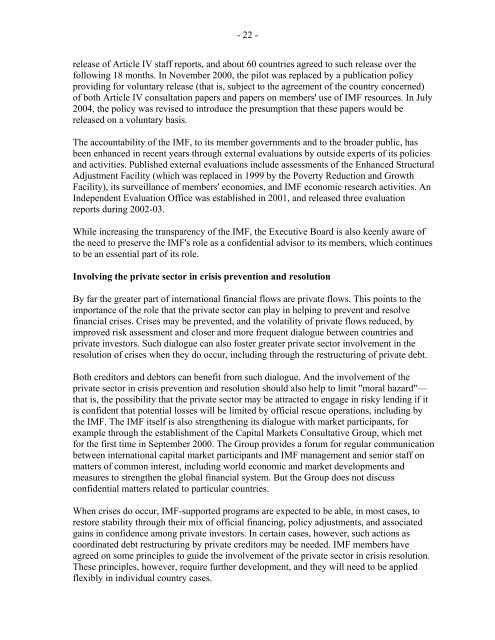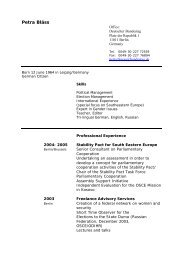What Is the International Monetary Fund? - the JVI eCampus!
What Is the International Monetary Fund? - the JVI eCampus!
What Is the International Monetary Fund? - the JVI eCampus!
You also want an ePaper? Increase the reach of your titles
YUMPU automatically turns print PDFs into web optimized ePapers that Google loves.
- 22 -<br />
release of Article IV staff reports, and about 60 countries agreed to such release over <strong>the</strong><br />
following 18 months. In November 2000, <strong>the</strong> pilot was replaced by a publication policy<br />
providing for voluntary release (that is, subject to <strong>the</strong> agreement of <strong>the</strong> country concerned)<br />
of both Article IV consultation papers and papers on members' use of IMF resources. In July<br />
2004, <strong>the</strong> policy was revised to introduce <strong>the</strong> presumption that <strong>the</strong>se papers would be<br />
released on a voluntary basis.<br />
The accountability of <strong>the</strong> IMF, to its member governments and to <strong>the</strong> broader public, has<br />
been enhanced in recent years through external evaluations by outside experts of its policies<br />
and activities. Published external evaluations include assessments of <strong>the</strong> Enhanced Structural<br />
Adjustment Facility (which was replaced in 1999 by <strong>the</strong> Poverty Reduction and Growth<br />
Facility), its surveillance of members' economies, and IMF economic research activities. An<br />
Independent Evaluation Office was established in 2001, and released three evaluation<br />
reports during 2002-03.<br />
While increasing <strong>the</strong> transparency of <strong>the</strong> IMF, <strong>the</strong> Executive Board is also keenly aware of<br />
<strong>the</strong> need to preserve <strong>the</strong> IMF's role as a confidential advisor to its members, which continues<br />
to be an essential part of its role.<br />
Involving <strong>the</strong> private sector in crisis prevention and resolution<br />
By far <strong>the</strong> greater part of international financial flows are private flows. This points to <strong>the</strong><br />
importance of <strong>the</strong> role that <strong>the</strong> private sector can play in helping to prevent and resolve<br />
financial crises. Crises may be prevented, and <strong>the</strong> volatility of private flows reduced, by<br />
improved risk assessment and closer and more frequent dialogue between countries and<br />
private investors. Such dialogue can also foster greater private sector involvement in <strong>the</strong><br />
resolution of crises when <strong>the</strong>y do occur, including through <strong>the</strong> restructuring of private debt.<br />
Both creditors and debtors can benefit from such dialogue. And <strong>the</strong> involvement of <strong>the</strong><br />
private sector in crisis prevention and resolution should also help to limit "moral hazard"—<br />
that is, <strong>the</strong> possibility that <strong>the</strong> private sector may be attracted to engage in risky lending if it<br />
is confident that potential losses will be limited by official rescue operations, including by<br />
<strong>the</strong> IMF. The IMF itself is also streng<strong>the</strong>ning its dialogue with market participants, for<br />
example through <strong>the</strong> establishment of <strong>the</strong> Capital Markets Consultative Group, which met<br />
for <strong>the</strong> first time in September 2000. The Group provides a forum for regular communication<br />
between international capital market participants and IMF management and senior staff on<br />
matters of common interest, including world economic and market developments and<br />
measures to streng<strong>the</strong>n <strong>the</strong> global financial system. But <strong>the</strong> Group does not discuss<br />
confidential matters related to particular countries.<br />
When crises do occur, IMF-supported programs are expected to be able, in most cases, to<br />
restore stability through <strong>the</strong>ir mix of official financing, policy adjustments, and associated<br />
gains in confidence among private investors. In certain cases, however, such actions as<br />
coordinated debt restructuring by private creditors may be needed. IMF members have<br />
agreed on some principles to guide <strong>the</strong> involvement of <strong>the</strong> private sector in crisis resolution.<br />
These principles, however, require fur<strong>the</strong>r development, and <strong>the</strong>y will need to be applied<br />
flexibly in individual country cases.



